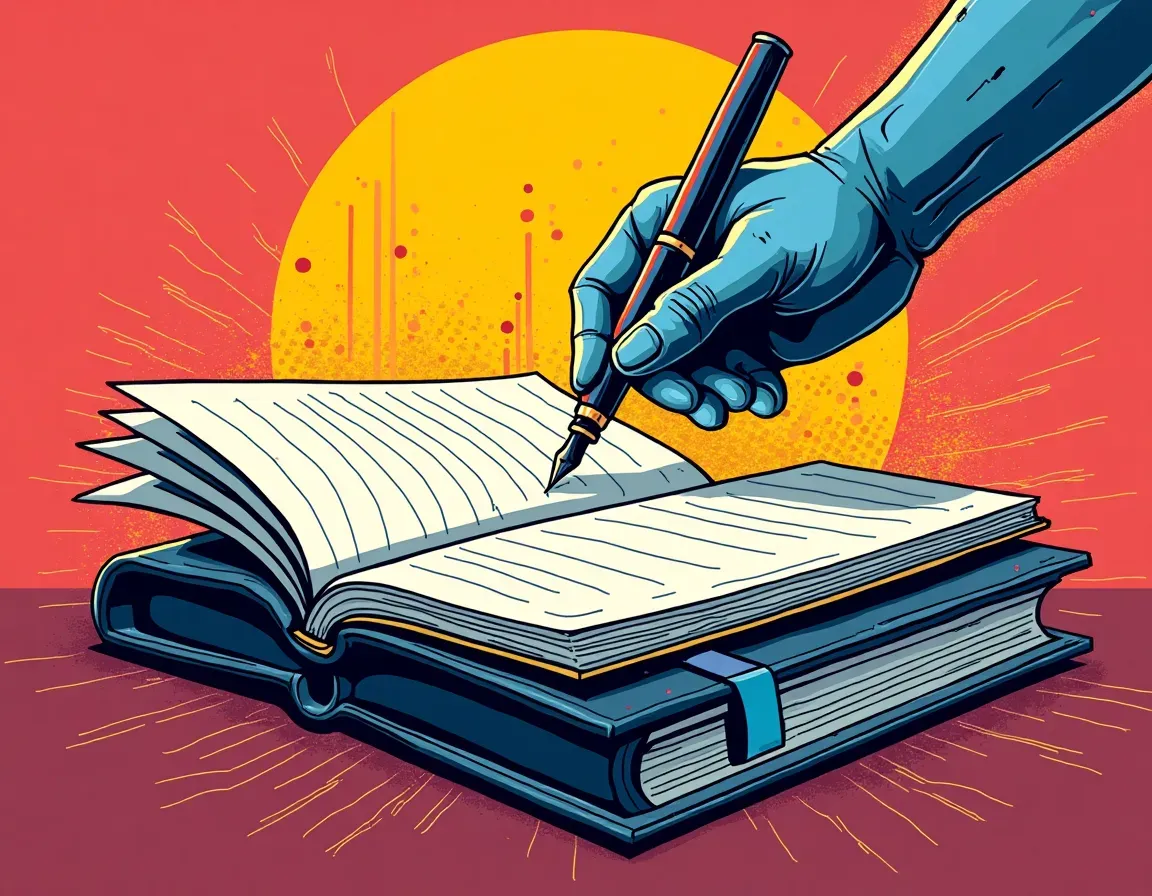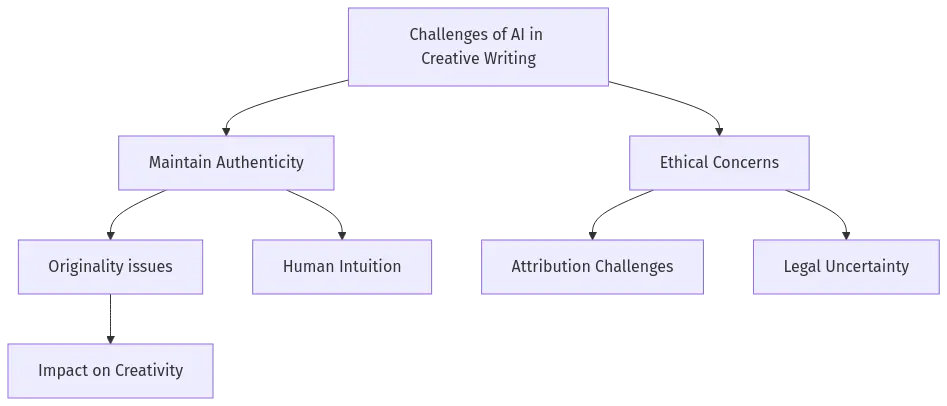AI AND CREATIVE WRITING: LIKE PUTTING A SUPERCHARGER ON SHAKESPEARE

I've been watching this whole AI revolution business with something between shock and awe. Bit like seeing a Bugatti Chiron for the first time - you can't quite believe it exists, but bloody hell, you know it's going to change everything.
For years, I've been hammering away at keyboards like a deranged orangutan, bashing out columns about cars and farming and the general idiocy of government officials who wouldn't know a good idea if it slapped them in the face with a wet kipper. So when everyone started banging on about AI writing tools, I thought it was just another tech fad – like 3D televisions or those ridiculous Google Glass things that made everyone look like they'd stepped out of a particularly low-budget science fiction film.
But then I actually tried some of these AI writing things. And I have to say, in the world of creative writing, AI is about to cause the biggest revolution since some bright spark realized you could use a pen instead of scratching on cave walls.
Table of Contents
- Introduction
- Power to the People: AI's Writing Opportunities
- When Robots Can't Write: The Challenges
- AI as Your Literary Wingman
- The Ethics of Mechanical Authors
- The Road Ahead: Man and Machine Writing Together
- Conclusions
- Sources
Introduction
The integration of AI into creative writing isn't just happening – it's already happened, like a literary coup d'état that occurred while most of us were busy watching cat videos on YouTube. It's transforming the way we write, mixing cold hard technology with the warm squishy bits of human creativity.
Like it or not (and I wasn't entirely sure I did), AI is boosting both productivity and imagination for writers everywhere. Of course, this raises more questions than a curious five-year-old on a sugar rush. What about authenticity? Who owns what when a machine helps write it? And most importantly, will anyone still need my particular brand of opinionated rambling when robots can generate insults far more creative than "slower than a three-legged sloth in treacle"?
As we dig into this brave new world of AI-assisted wordsmithery, we'll look at how these digital writing assistants might help us poor human scribblers rather than rendering us as obsolete as a coal-powered hairdryer.
Power to the People: AI's Writing Opportunities
AI has charged into the writing world like a testosterone-fueled teenager in his dad's Ferrari – all power and no subtlety, but bloody hell, it's impressive. Writers now have access to tools that make the old days of Microsoft Word's grammar check look like the literary equivalent of a horse and cart.
Streamlined Content Creation
Look, I've spent decades crafting sentences about the precise way a V12 engine makes the hairs on the back of your neck stand up. It takes TIME. But these new AI writing tools – your Rytrs, your Jaspers, your StoryChiefs – can knock out blog posts and social media drivel faster than I can open a bottle of rosé after a hard day on the farm. They use pre-designed templates to organize ideas efficiently, which means what used to take me a day now takes approximately the same time as a Formula 1 pit stop.
Multilingual Support and Plagiarism Checks
Some of these AI whatsits can write in 30 different languages, which is approximately 29 more than I can manage. Rytr will happily translate your deathless prose into everything from French to Finnish without breaking a digital sweat. They've also got built-in plagiarism checkers, which would have been bloody useful when I was at school and convinced my Geography teacher that I'd written that suspiciously eloquent essay about erosional landforms.
Efficiency in Research and Rewriting
Research used to mean spending hours in a library surrounded by dusty books and people who look at you funny when you sneeze. POWERRRRR to the AI! Tools like Articoolo now gather information faster than an HMRC tax inspector spotting an unclaimed expense. They'll rewrite content too, though I suspect they'd struggle with my particular style unless there's a "bombastic middle-aged Englishman" setting I haven't found yet.
Grammar, Spell, and Style Improvement
I've never been overly troubled by the finer points of grammar. If you can understand what I'm saying, I consider that a roaring success. But for those who care about such things, Grammarly and ProWritingAid will polish your prose until it gleams like a freshly waxed Ferrari. They'll catch every misplaced comma and dangling participle, whatever the hell that is.
Creative Brainstorming
Writer's block is about as welcome as a vegetarian at a barbecue. But platforms like ChatGPT are apparently brilliant for brainstorming. Ask it for ideas about a story featuring a three-legged cat who solves crimes, and it'll give you enough material for a 12-part Netflix series. I tried this last week after a particularly generous pouring of Château d'Esclans, and by morning I had the outline for a novel about a detective who's also a combine harvester. I blame the rosé, not the AI.
For those churning out content like a factory – which seems to be everyone these days – AI tools make it possible to produce vast quantities without hiring an army of monkeys with typewriters. WrittenLabs can generate enough articles to fill a small library before you've finished your morning coffee.
And that means, if you're a man, you'll like it.
| Fig-1-Opportunities of AI tools in creative writing showing various AI tools and their functions. | |||
| AI Tool | Function | Benefits | Common Usage |
| Rytr | Content Generation | Fast, polished drafts | Social media, blogs |
| Jasper | SEO Optimization | High-quality content | Articles, marketing |
| Grammarly | Grammar and Style | Improved writing quality | Academic, professional |
| ChatGPT | Brainstorming and Idea Generation | Inspiration boost | Creative writing |
When Robots Can't Write: The Challenges
Now, before we all rush off to replace Shakespeare with silicon chips, there are some rather sizeable potholes in the AI superhighway. And like any good country lane in rural England after a particularly enthusiastic winter, these potholes could swallow your literary ambitions whole.
The biggest issue is that AI has about as much genuine human emotion as a filing cabinet. Real creativity – proper, meaningful storytelling – comes from having lived a life. It comes from getting drunk and making terrible decisions. From falling in love. From standing in the rain at a funeral. From the time your tractor got stuck in the mud and you had to be rescued by the neighbor you've been feuding with for ten years over boundary disputes.
AI hasn't done any of that. It's just gorged itself on the entire internet and learned to regurgitate patterns in increasingly convincing ways. Like a parrot that's learned to sound exactly like your mother-in-law – impressive, but ultimately lacking genuine insight.
A recent study showed that AI-generated works are about as rich in perspective and nuance as a government pamphlet on tax efficiency [Source: Swiftbook Publishing]. They can create something technically correct, but it lacks the soul, the grit, the little imperfections that make human writing worth reading.
Then there's the small matter of who actually owns what when a robot helps write your magnum opus. Is it you? The AI? The company that made the AI? The thousands of uncredited authors whose works were fed into the AI to teach it how to write in the first place? It's a legal quagmire deeper than the mud pit my Land Rover Discovery sank into last harvest season. Took three tractors to pull it out, by the way.
And another thing – what happens when everyone starts using the same AI tools? We'll end up with a literary landscape as diverse and exciting as a car park full of nothing but grey Volkswagen Golfs. Practical? Yes. Soul-destroying? Absolutely.
There's also something to be said for the craft of writing. I've been hammering away at keyboards for decades now, developing a voice that's recognizably mine – for better or worse. If AI does all the heavy lifting, we'll lose that development of unique voices and styles [Source: GovLoop]. It's like replacing a handcrafted Morgan with a mass-produced Kia – it might get you to the same place, but the journey feels entirely different.
So while AI might be brilliant at churning out shopping lists and corporate reports and those mind-numbing terms and conditions nobody reads, it's still got some way to go before it can write with the human touch that makes you laugh, cry, or throw the book across the room in outrage.

Fig-2-Challenges of AI in creative writing showing the balance needed between AI assistance and human creative input
AI as Your Literary Wingman
What if, and bear with me here, AI isn't meant to replace writers but to supercharge them? Like strapping a jet engine to a bicycle – alarming at first, but potentially brilliant once you've figured out how not to crash into a hedge at 200 miles per hour.
Enhancement of Individual Creativity
I've been writing for long enough to know that staring at a blank page is about as productive as trying to get straight answers from a politician. AI can jump-start the process by suggesting ideas that human writers can then develop and enrich. Some boffins did a study – because there's always a study – showing writers collaborating with AI produced stories that readers actually enjoyed more than purely human or purely AI-generated ones. Much like adding a turbocharger to an already decent engine, the combination creates something greater than the sum of its parts.
A while back I tried using one of these AI things to help with an article about tractors. I thought it would be rubbish, but the digital know-it-all actually suggested some interesting technical comparisons I hadn't considered. Of course, I had to rewrite everything in my own voice because it sounded like it had been written by a particularly enthusiastic agricultural machinery salesman who'd consumed too many energy drinks.
Boosting Productivity and Novelty
The thing about these AI assistants is they can throw out ten ideas in the time it takes me to eat a biscuit. Some will be useless – like suggesting a comparison between a Ferrari and a wheelbarrow – but others might spark genuine creativity. It's like having an eager research assistant who never sleeps, never complains, and doesn't steal your booze.
Writers who use AI prompts report both higher quality and more original work. Now, I was skeptical about this – about as skeptical as I am about electric cars being the future of motoring – but I've seen some evidence that having a broader range of suggestions can push you into creative territories you wouldn't have ventured into otherwise.
Democratizing Creativity
One thing I will grudgingly admit is that AI writing tools are making creativity more accessible. Not everyone had my good fortune of stumbling into journalism because they could string together entertaining sentences about horsepower and torque. These tools are like power steering for writers – they don't drive the car for you, but they make it easier to steer in the right direction.
When I first started writing, you needed connections, education, and a lot of luck to get published. Now any farmer with a laptop and an AI assistant can potentially create content that people actually want to read. Whether that's a good thing or not depends entirely on the farmer, I suppose.
Potential Risks of Homogenization
But – and this is a but the size of a combine harvester – there's a risk that if everyone's using the same AI tools, everything starts to sound the same. It's like if every car manufacturer used exactly the same engine. Where's the character? Where's the distinction? Where's the opportunity to mock French cars for their peculiar suspension?
Creators need to remain vigilant about maintaining their unique perspectives. If your AI assistant suggests a phrase and you think "that sounds like something everyone would write," then for God's sake, don't use it. You might as well wear the same clothes as everyone else at a party – practical, but utterly forgettable.
| Fig-3-Creativity Comparison showing the difference between pure human writing, AI-assisted, and pure AI content creation | ||
| Aspect | Without AI | With AI |
| Creativity Level | Medium | High |
| Novelty | Moderate | Enhanced |
| Productivity | Lower | Higher |
| Diversity of Ideas | Limited | Broader |
Fig-3-Creativity Comparison showing comparative analysis of creativity with and without AI assistance
The Ethics of Mechanical Authors
Now, I'm not usually one to get bogged down in ethical quandaries – that's what university professors with elbow patches are for – but even I have to admit there are some serious questions floating around this AI writing malarkey.
First off, there's the question of who's responsible when AI gets things catastrophically wrong. I once wrote a column where I mixed up the power outputs of two very different tractors, and I got approximately 3,427 angry letters from farmers. I deserved them. I got it wrong. My mistake, my responsibility.
But what happens when AI creates content with a mistake? Who's to blame then? The machine? The programmer? The poor sod who pressed the button? As someone rightly pointed out, "AI cannot be considered an author because it cannot take responsibility for the accuracy, integrity, or intellectual contributions of the work" [Source: AIMultiple]. AI has all the accountability of a cat knocking a vase off a shelf – it might have done it, but it feels absolutely no remorse.
Then there's plagiarism, which is about as welcome in writing as a wasp in your beer. AI tools hoover up content from across the internet, process it, and spit out something new-ish. But how new is new enough? I could rewrite Hemingway with different adjectives, but it would still be fundamentally Hemingway's work, just worse. If AI is essentially doing the same thing on a massive scale, we're in murky waters deeper than the time I tried to drive my Range Rover through what I thought was a "shallow" stream.
And another thing – what about all the writers who might be out of a job? I'm probably safe because, let's be honest, no one's created an AI that can be quite as irascible and opinionated as I am (thank God). But what about all those people churning out product descriptions or basic news reports? I've spent enough time on my farm to know that when technology makes a job redundant, it rarely ends well for the humans involved.
As we barrel toward 2030 like a sports car with no brakes, several trends are emerging:
- Human Oversight: Even the most enthusiastic tech evangelists are admitting that humans need to keep their eyes on what AI produces. Like letting a teenager drive your car – technically they can do it, but you'd be mad not to check the oil afterward.
- Clear Policies: Universities and businesses are scrambling to establish rules about AI usage faster than government departments can create pointless regulations. These policies need to balance innovation with integrity, which is about as easy as balancing a combine harvester on a ping-pong ball.
- Education and Training: People will need to learn how to use these tools responsibly. I once gave my farm manager access to the farm's Twitter account without proper guidance, and within an hour he'd somehow offended an entire county of sheep farmers.
- Technological Solutions: In a delicious irony, we'll likely need more AI to detect AI-generated content. It's like creating a fox to catch the fox that's been catching your chickens – clever in theory, potentially disastrous in practice.
The path forward requires something that technology companies aren't exactly famous for – ethical consideration and restraint. As one researcher put it, "The role of human oversight and critical thinking remains paramount" [Source: PMC]. Which is a fancy way of saying "don't let the robots run amok."
| Ethical Concerns | Description | Future Trends by 2030 |
|---|---|---|
| Authorship | AI lacks accountability for the information it generates. | Stronger human oversight required. |
| Plagiarism | AI-generated content may resemble existing works, raising citation issues. | Enhanced clarity in institutional policies. |
| Job Displacement | Concerns over AI replacing human writers. | Focus on blending AI support with human creativity. |
| Misinformation | AI can produce misleading content. | Tools developed for verifying AI-generated content. |
Fig-4-Ethical Challenges showing Ethical Concerns and Future Trends in AI Writing
The Road Ahead: Man and Machine Writing Together
I used to think that AI writing tools were for people who couldn't string a sentence together without adult supervision. But much like I eventually came around to the idea that some Japanese cars might actually be quite good (don't tell anyone I said that), I've had to reconsider my position.
The future isn't about AI replacing writers – that would be like replacing a chef with a microwave. It might get the job done, but you'd never get anything truly spectacular. No, the future is about collaboration – humans and machines working together like a well-tuned engine and a skilled driver.
AI tools can handle the grunt work – the research, the basic structure, the tedious bits that make writing sometimes feel like filling out tax forms. This frees up human writers to focus on what they do best: bringing emotion, perspective, and that indefinable spark that makes a piece of writing worth reading in the first place [Source: Helping Writers Become Authors].
I tried this approach recently on an article about the declining quality of British country pubs. The AI gave me all the boring statistics about closures and economic factors, while I supplied the righteous indignation and colorful anecdotes about landlords I've known who could pour a perfect pint while simultaneously breaking up a fight and solving a customer's marital problems.
Looking forward, several exciting trends are emerging, though I'd bet my best tractor that at least half of them will turn out to be nonsense:
- Multimodal Storytelling: AI will help blend text with images and sounds, creating more immersive narratives. Though if this means more of those awful interactive books where you have to make choices, count me out. I prefer my stories like I prefer my whisky – straightforward and strong.
- Adaptive Narratives: Stories that change based on reader interaction. It's like those "choose your own adventure" books I used to read as a child, except now the possibilities are endless. And, I suspect, endless ways to be disappointed by a story's ending.
- Collaborative Ecosystems: Networks of specialized AI working together to assist in different aspects of writing. It sounds impressive until it inevitably goes wrong and you end up with a romance novel that suddenly turns into a military hardware catalog halfway through.
- Preservation: AI can help maintain historical or cultural storytelling traditions. This actually isn't a bad idea – we're losing dialects and oral histories faster than I lose my reading glasses, which is saying something.
The key to all this, as one expert pointed out in what must have been a moment of blinding clarity, is for writers to perform a "personal gut check" when using AI tools [Source: Rishad Substack]. In other words, if it doesn't feel right, don't use it. It's the same principle I apply to discount sausages and blind dates.
In the end, the future of writing isn't a competition between humans and machines, but a partnership. And like all good partnerships – Lennon and McCartney, fish and chips, me and a glass of rosé on a summer evening – the combination should produce something better than either could alone.
Conclusions
So there we have it. AI writing tools aren't the literary apocalypse I initially feared, nor are they the magical solution to all writing problems that Silicon Valley types would have you believe. They're tools – powerful ones, certainly, but tools nonetheless.
Used properly, they can enhance human creativity rather than replace it. They can do the heavy lifting while we humans provide the finesse, like a tractor handling the fieldwork while the farmer decides what to plant and when to harvest.
The writers who will thrive in this brave new world won't be those who resist technology altogether, nor those who surrender completely to it. It'll be those who find the sweet spot – using AI to handle the parts of writing that feel like work, while reserving the parts that feel like art for themselves.
And on that bombshell, it's time to end. Now if you'll excuse me, I need to go and ask my AI assistant to help me draft a strongly worded letter to the council about the state of the roads near my farm. Though I suspect I'll need to edit out most of its suggestions – AI, it seems, hasn't yet mastered the art of constructive outrage.
Sources
- Swiftbook Publishing - How AI Affects Creative Writing (Accessed: 2025-05-21)
- GovLoop - Achieving Authentic Authorship in the Age of AI (Accessed: 2025-05-21)
- AIMultiple - Generative AI Ethics (Accessed: 2025-05-21)
- PMC - Ethical Considerations in AI Use (Accessed: 2025-05-21)
- Helping Writers Become Authors - Impact of AI on Fiction Writing (Accessed: 2025-05-21)
- Rishad Substack - AI and the Future of Writing (Accessed: 2025-05-21)
- Contentoo - AI Content Creation is Shaping Creative Writing (Accessed: 2025-05-21)
- Tech Insider - Why AI Will Transform Creative Writing (Accessed: 2025-05-21)



